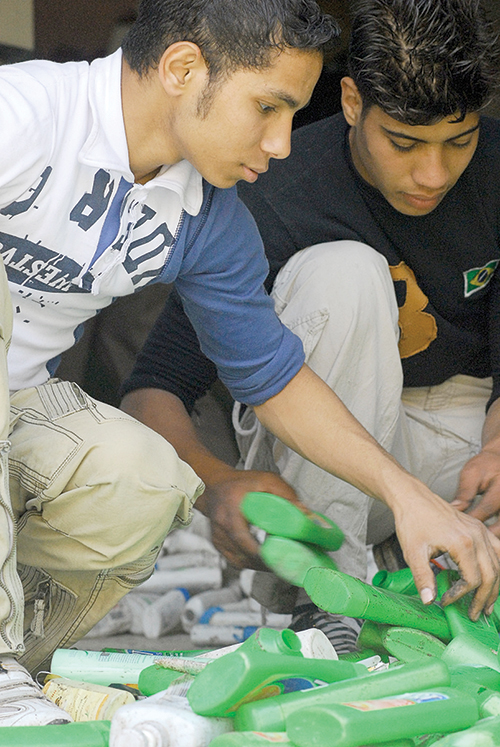Most Americans, we Portlanders in particular, are used to hearing the shrill early morning chirp of the recycling truck. Some of us have already begun our day, others cover their heads with pillows in annoyance, and a small percentage of the population sleep right through it.
I dream of garbage

Most Americans, we Portlanders in particular, are used to hearing the shrill early morning chirp of the recycling truck. Some of us have already begun our day, others cover their heads with pillows in annoyance, and a small percentage of the population sleep right through it.
Portland is well-known for its recycling endeavors and prides itself on its efforts. Soon, however, Portland State’s Middle East Studies Center, in partnership with Portland’s Institute for Sustainable Solutions, will present the community with a new perspective on waste management.
This Saturday, the center will present a screening of Garbage Dreams as the second part of its film series, which focuses on recycling.
Speakers Ashley Tjaden, the recycling specialist for the city of Gresham, and Lee Barrett, former manager of the waste reduction division at Metro, will begin the event by introducing the film.
After the showing, the audience will have the opportunity to engage in a discussion with the speakers.
Elisheva Cohen, the outreach coordinator for the center, explained the significance of the film.
“The purpose of this event is several-fold,” she said. “First, it’s to highlight this recycling community in Cairo, and to look at how recycling and waste management happens in the Middle East and in different parts of the world, and to look at how that compares and contrasts to [recycling] in Portland.
“Two, it aims to highlight a sliver of life in the Middle East in this particular community—what it’s like living there as a young person,” Cohen said. “And I think the conversation is going to be exciting and interesting as well.”
The center’s screening of Garbage Dreams is no exception to their overall themes of recycling and the lives of young people. The film focuses on the lives of the Zaballeen people in Cairo, specifically three teenagers living in what is known as “Garbage Village.”
The Zaballeens are a group of people who collect Cairo’s waste and sorting it into compost, recyclables and garbage. They are a private organization that uses this system to support their village.
The documentary takes the audience through the lives of the three young males and highlights their journey, strife and struggle. Cohen enjoys the documentary and has learned a lot from it.
“I think what goes on in Garbage Village is incredibly fascinating, both because of how successful they are in recycling and how they’re doing such a great job in the environment and the model they’ve used,” she said. “It has been used as a model of recycling around the word. Unfortunately, however, it’s incredibly problematic for the people living in Garage Village, for their lives, safety and well-being, and this film does a good job of showing those contrasts and that dichotomy,” Cohen said.
The choice of speakers for the event was carefully thought out, Cohen explained, because the center wanted speakers who exemplified two specific qualities.
Garbage Dreams
Saturday, March 16, 7 p.m.
Smith Memorial Student Union, room 327
Free and open to the public
“I wanted someone who could talk about this topic [from] a comparative angle and about what is going on in Portland as well as around the world,” Cohen said. “They were well-recommended to me by the Institute for Sustainable Solutions, whom we are partnering with in this event.”
Barrett, who will speak briefly about the waste management system in Portland, explained the significance this film might have in the city.
“I think it might be interesting for the Portland people to see how good and unified the system is here as opposed to in Cairo and other places—it’s quite organized here, on a political level,” he said.
Barrett explained that his former job was not difficult thanks to the extreme dedication of the citizens of Portland to ensuring recyclables are dealt with properly. This film will aid in an understanding of recycling on a global scale.
“When I was working [for] the city of Portland, we didn’t have to spend a lot of our time convincing the public that recycling was the right thing to do, we just had to tell them, ‘Here’s the proper way to recycle,’” Barrett said. “There are a lot of teams whose battle is convincing the public that they should recycle at all. The Portland people want to recycle. They just want to know what to recycle and how to recycle it.”
Cohen agreed, saying the purpose of the event was mostly to inform the public on the happenings of the world, specifically in the Middle East.
“I think it’s mostly informative: We’re not pushing any sort of call to action,” she said. “We’re looking to raise awareness of what’s going on in the world, and show a slice of life from the Middle East, and to give people an understanding of life there generally and specifically in this context.”





